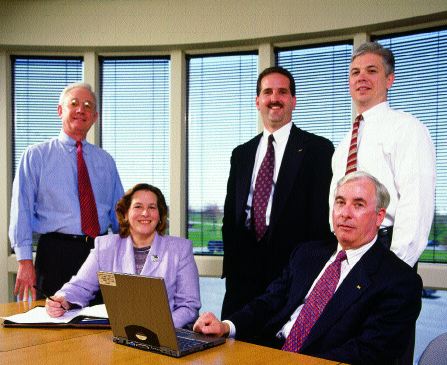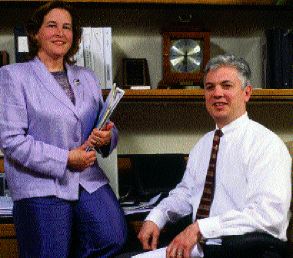
By Phil Zinkewicz

The executive team of Horst Insurance in Lancaster, Pennsylvania, includes (standing, left to right) David H. Berndt, president; David C. King, senior vice president; and David J. Berndt, vice president. Seated (left to right) are Sandra R. Gordon, vice president of client services and Louis R. Kolber, vice president.
For David H. Berndt, president of Horst Insurance, managing a large agency is a matter of choosing the fundamental strategies necessary to serve an ever-changing marketplace. From there, it's up to Dave King, senior vice president of sales and marketing at the Lancaster, Pennsylvania-based Horst Insurance Agency, and his executive team to implement those strategies in a way that benefits both clients and employees. "Few changes have had as profound an effect as our shift from managing processes to managing relationships," says Dave. "That change boils down to one word--differentiation."
When Dave talks about his role in creating an agency that is more focused on relationships and differentiation, he relates a personal story. One day, Dave was sitting in his home basement waiting for some plumbers to arrive to give estimates for a new furnace. For most of us, as it was for Dave initially, this is a relatively mundane chore--something that's necessary to do but not very exciting, like going for a haircut. But for Dave, that day turned into a revelation of sorts, a moment in life that he likes to call his very own "epiphany." From that moment on, the Horst Insurance Agency and all its staff were about to set out on a journey, a journey that would "differentiate the agency from most of its competitors" and one that has not ended yet, he says.
A tale of three plumbers
"I tell this story whenever I'm speaking before agents' groups," says Dave. "My wife and I had bought a house that was in need of repairs. One day the furnace went out on us. Using the local Yellow Pages, I called three plumbers, about whom I knew nothing, to come and give us an estimate on a new furnace. With the first two plumbing outfits that came, there were similar experiences. In both visits, just as I expected, the plumbers went right for the basement. They wrote down some numbers that were on the furnace and told me I would receive an estimate in a few days.
 "Few changes have had as profound an effect as our shift from managing processes to managing relationships."
"Few changes have had as profound an effect as our shift from managing processes to managing relationships."
"However, the third plumber I called was totally different from the other two," continues Dave. "Unlike the first two plumbers who arrived in the usual plumbers' van, this man arrived in a nice car. He was well dressed and courteously introduced himself to me as a 'client manager' for the plumbing firm. I invited him into the house, but before he came in he surprised me by putting on a pair of surgical booties over his shoes. I told him this wasn't necessary, but he said he had been to other houses that day and didn't think it proper to drag other people's dirt into someone else's house. Unlike the other plumbers, he didn't go right for the basement but sat at our kitchen table and asked my wife and me questions regarding how much water we used on a daily basis, how many showers we took, things like that.
"After he gleaned the information he needed, he then asked to see the furnace. After examining it, he told me that he believed the furnace was twice as big as our house needed. But he didn't stop there. He examined every room in the house, every radiator, and then said they confirmed his contention about the furnace being too large. Some time later I received in the mail, not just an estimate, but a portfolio of sorts. It contained a printout of 21 reasons why people should do business with his firm, a personal handwritten letter from him, two client testimonials and then the estimate.
"The estimate, by the way was higher than the other two plumbing firms had sent, but I hired this third one. Despite the money, I felt more comfortable with him and we've had a pleasant business relationship ever since."
Defining "added value"
A happy ending, to be sure, but that incident did more than provide Dave with a new furnace. It got him thinking about his own agency. That plumbing firm "really got it" when it came to relationship management and differentiation, according to Dave. He met with his production staff and asked them if they could come up with 21 reasons, as the plumber did, why people should do business with the Horst Agency. "Let's just say we were a bit short of that number and needing some focus," says Dave. "Actually, the whole experience startled me. I knew we added value, but it needed better definition. And did we add enough value to differentiate ourselves from our competitors?"
 Sandra Gordon and D.J. Berndt are part of the Horst team whose goal is to set its sights on meeting and exceeding clients' expectations.
Sandra Gordon and D.J. Berndt are part of the Horst team whose goal is to set its sights on meeting and exceeding clients' expectations.
To answer that question, Dave and his staff broke down the agency's services to its clients into four categories, and they remain hanging from boards in the agency to this day. Those categories are: What are our clients' minimal expectations? What should we be adding/doing? What should we consider doing in the future? And "Pipedreams."
Says Dave: "We had a discussion among ourselves to determine which services we provided should fall into the first two categories. At the end of the day, we were alarmed to discover that many of our perceived 'value-added services' really fell into the minimal clients' expectations category--things such as 'commitment to service,' or 'expert knowledge' or 'competitive pricing.' It stands to reason that, if services performed fall into minimal clients' expectations, they cannot be 'added' value."
It should be remembered that, at this time, the Horst Agency was already established in the insurance business. Its parent company, the Horst Group, has as two of its core businesses the construction industry and property management, a natural blend with insurance. So there was really no immediate need to make drastic changes. But Dave and his co-producers are products of the "Sitkins 100" school of agency growth, and he was determined to have his agency "stand out" from its competitors. The first step was to expand the number of value-added services that did not fall under clients' minimal expectations.
Preventive medicine: the audit check
For example, one of the added services now offered by Horst is an audit check system, geared to making sure, at several points throughout the policy year, that there will be no "audit surprises" at the end of the year. "In the area of workers compensation, for example, one of the hardest things that plays on a client-agency relationship is for the client to find at the end of the year that an additional premium is due to the carrier. When we send our client an exposure summary periodically, they can see during the year whether they correctly estimated their payrolls at the beginning of the year when the client and carrier first settled on the premium. They can increase their premium payments during the year if needed. If they choose not to, then at least we have kept them informed and there will be no surprises at year end," says Dave.
In addition, Horst has established an executive visitation program. "We take this very seriously," says Dave. "There are some clients who never meet the principals of the agencies they deal with. We go out to the client's location and, by doing so, we not only demonstrate that we consider it important to meet with them, but we also find out more about the actual risk."
 Horst's "executive visitation program" sees to it that agency executives, including Louis Kolber (right), visit their clients' locations to demonstrate personal interest and find out more about the actual risk.
Horst's "executive visitation program" sees to it that agency executives, including Louis Kolber (right), visit their clients' locations to demonstrate personal interest and find out more about the actual risk.
Dave says Horst is determined to go that extra mile for its clients. "In the employee benefits area, for example, when a client takes on a new program the enrollment process can be extremely difficult for the client. We take care of the enrollment process, filling out the necessary forms, making sure that a representative of the carrier is there to answer questions at the time of enrollment, making sure that everything runs smoothly," says Dave. "We do the same thing on the claims side. We don't believe in just giving clients a toll-free number to get in touch with the carrier and leave it at that. We believe we have to be there to answer questions when a claim arises."
To demonstrate its commitment to adding value, Horst has made a financial investment in encouraging and assisting its staff in paying more attention to client relationships. For example, Horst currently is devoting resources to "customer-centered training." Says Dave: "In the first stage, we've called it 'TEAM.' The 'T' is treating customers in a friendly and professional manner every time. The 'E' means that every new piece of business will be acknowledged within one week with some type of special thank you. The 'A' means that all customers should feel that they have our full attention with every contract. And the 'M' demands that mistakes be quickly admitted and fixed. Many agencies say that they do these things, but very often they put off that thank you letter until the next week and then forget about it because they're too busy."
A cornerstone of Horst's differentiation effort is a "whatever it takes" attitude toward serving clients. Dave has segregated the agency's clientele into "client advocates," "loyal clients," and "satisfied clients." The client advocate not only is loyal, but also recommends the agency to other businesses. The loyal client may not recommend the agency but will remain with the agency because of its performance. The satisfied client may shop around from time to time. "We have empowered our staff to do whatever it takes to encourage the loyal client to become a client advocate and to encourage the satisfied client to become a loyal client," says Dave. "We've even hired an outside research team to help us achieve these goals."
What's more, Horst believes in being visible to its clients. They are often invited to visit with agency executives and staff at the company's impressive headquarters in Lancaster. "We believe in exposure in print," says Dave. "We've created a new corporate brochure and smaller brochures for commercial lines, personal lines, life and health, and financial services. We're making prominent use of client testimonials."
It's obvious that the Horst Agency has undergone significant changes since Dave King's furnace broke down. And, according to Dave, more changes are in store. "We've only just begun," he says. *